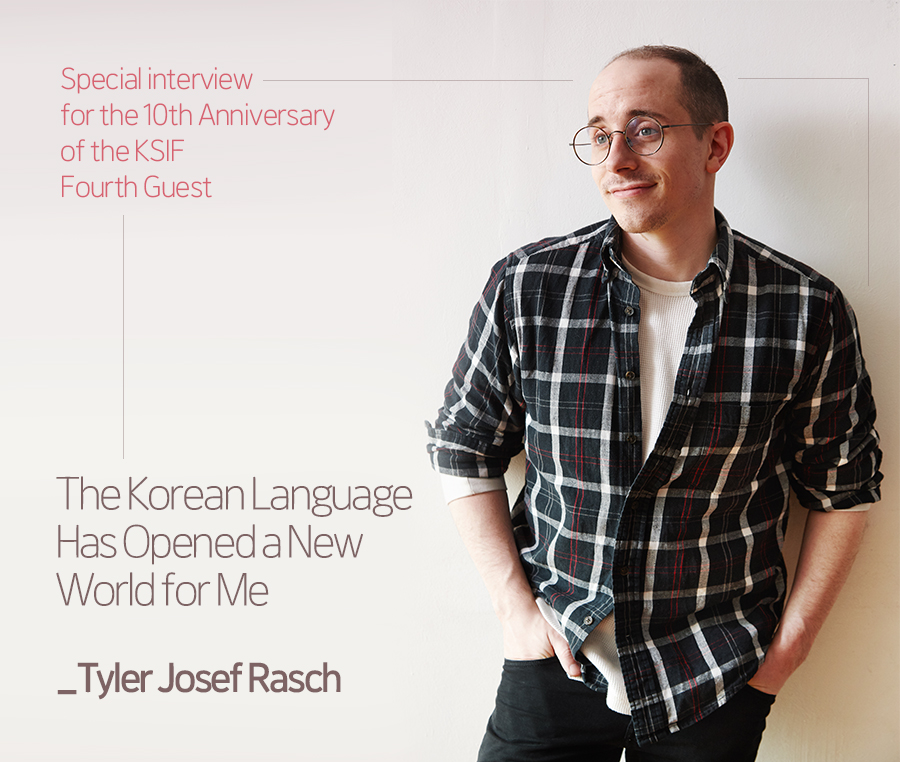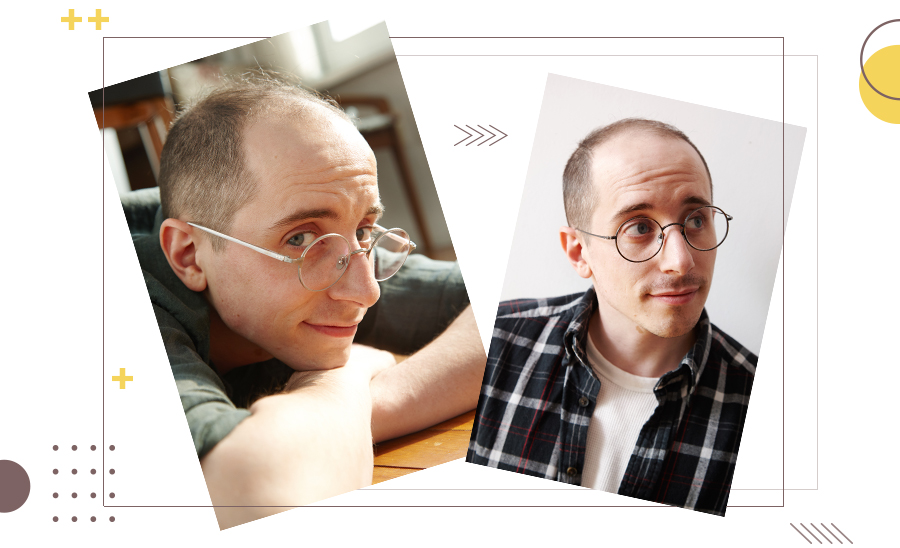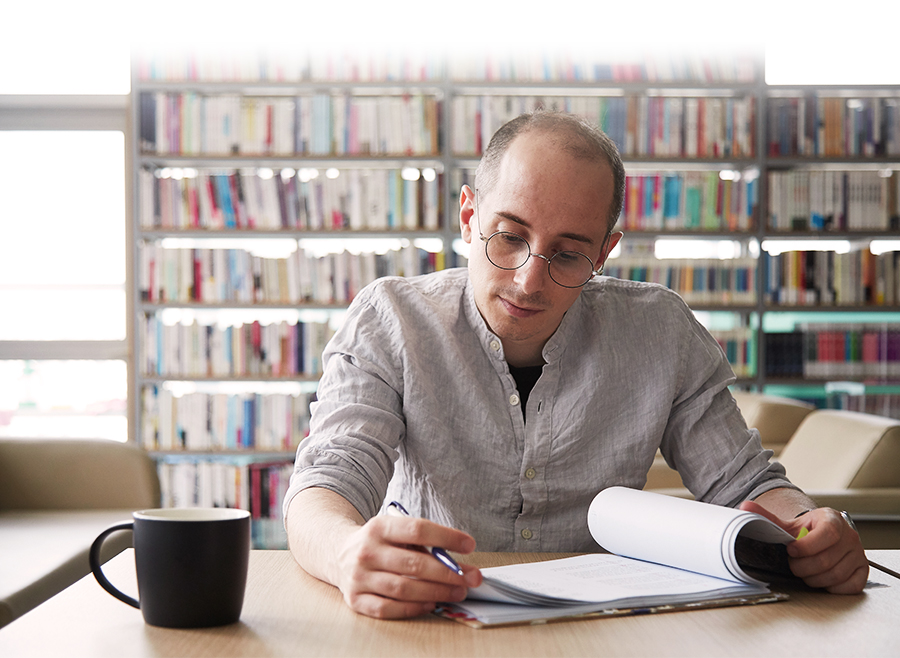Writer홍보협력팀
Tag
2022-04-15
View835



Tyler Rasch, a friendly person with clear eyes and an open face, expresses his ideas clearly in fluent Korean. Here he talks about himself in relation to the Korean language.
 Great to see you! We at KSIF Newsletter have been wanting to interview you, but you seem to have a lot on your plate. What keeps you busy these days?
Great to see you! We at KSIF Newsletter have been wanting to interview you, but you seem to have a lot on your plate. What keeps you busy these days?As spring’s just around the corner, my activities are increasing gradually. As you may already know, I continue working on TV and radio and am thinking of writing a new book. I’m also working with my business partner in relation to export and overseas market entry in popular culture and art areas, though small in scale. Personally, I have a pet dog and paint for fun as usual. One of my goals this year is to communicate with family far away. It’s not easy due to the time difference, but I’m trying hard to talk with my family more often.
 If I’m correct, you started learning Korean in your freshman year of college, majored in international politics, and wrote The Impact of North Korea’s Great Famine in 1990 on the Legal System as your bachelor’s thesis. You seem to have much interest in Korea even before you came to Korea. What motivated you to develop an interest in learning Korean?
If I’m correct, you started learning Korean in your freshman year of college, majored in international politics, and wrote The Impact of North Korea’s Great Famine in 1990 on the Legal System as your bachelor’s thesis. You seem to have much interest in Korea even before you came to Korea. What motivated you to develop an interest in learning Korean?Well, I was interested in foreign languages since I was young. Learning a foreign language is like tasting a new dish. Its food texture, taste, and impression give us new feelings and ideas. You eat the same food every day and get fed up. Likewise, I felt something missing in my heart while studying the languages that share similar history, culture, and philosophy or have the same roots. So while studying Portuguese, French, Spanish, and German, I wanted to find a language that has an entirely different system, which was Korean.
I was attracted to Korean because its word order is opposite to English and it includes Chinese characters, native Korean words, which are extremely different from the languages I had learned. Above all, the Korean language helped me think outside the box and brought me fresh perspectives on culture, history, and the world.

 I’m told that you studied Korean on your own at first, but you attended the Washington Korean Cultural Center KSI. In what ways did KSI help you learn Korean compared to studying alone? Is there any fun memory about KSI other than learning Korean? Also, I would like to ask you what comes to mind when you think of KSI.
I’m told that you studied Korean on your own at first, but you attended the Washington Korean Cultural Center KSI. In what ways did KSI help you learn Korean compared to studying alone? Is there any fun memory about KSI other than learning Korean? Also, I would like to ask you what comes to mind when you think of KSI.To be precise, I started studying Korean on my own during the summer vacation after I completed the freshman year and started taking classes from the first semester of my sophomore year. After one-year study, I visited Seoul for three-month language training. I returned to Chicago and continued studying Korean until I graduated from college. After graduation, I worked at the Korean Embassy in the USA. Although my job required English only mostly, I also had many chances to use Korean and learn Korean idioms and expressions. I thought that it would be difficult to maintain or improve my Korean language skills if I continue working in Washington. So I decided to take night courses at KSI. Since the Washington Korean Cultural Center KSI was right next to the Korean embassy, I could have many opportunities to participate in many cultural events held there and community activities related to the center and brush up my Korean, which was quite helpful for me to improve my Korean.
You asked what comes to mind when I think of KSI. I remember when I enjoyed making gimbap with the teacher who taught the class I took at a cultural event that was held at KSI. At that time, I noticed that there was some distance between the students and the teachers at the language school in Korea. But I didn’t feel such distance between the teachers and the students at KSI, which was quite impressive.
 I know you read a lot of books written in Korean. What was the first book you read and what was your impression? What books would like to recommend to KSI students?
I know you read a lot of books written in Korean. What was the first book you read and what was your impression? What books would like to recommend to KSI students?I"m a little worried because I don"t read Korean books these days. I’d better start reading again (laughing). The first Korean book I read was Mrs. Yoko’s Life in Korea written by a Japanese lady who was living in Korea with her Korean husband. The book had illustrations on the left page and short essays related to the illustrations on the right pages. It contained essays on how she was surprised to encounter bikes being ridden on the sidewalks and ladies who completely cover their skin with clothing and walk briskly in parks like robots, for instance. At that time, I was receiving language training in Korea and the stories resonated with me. The book was written in simple vocabulary and thus ideal for elementary Korean learners. I could learn many expressions related to everyday life. While Korean language learners may want to read books written in Korean by Korean writers, I think elementary and intermediary learners would find books on familiar themes that are written in simple vocabulary. I recommend books that are written by foreigners who have experience in living in Korea.

 What are the Korean words or sentences that you like in particular and why do you like them, if any? You’re also well versed in Korean local dialects. Is there any local dialect you like and if yes, why?
What are the Korean words or sentences that you like in particular and why do you like them, if any? You’re also well versed in Korean local dialects. Is there any local dialect you like and if yes, why?I guess there are no Korean words or sentences that I like in particular. I just like the Korean texture or something like that. Pronunciation and intonation create the texture. I especially like fortis but I don’t know why.
To be honest, I haven’t had many chances to get to know Korean dialects. Except the dialect used in the Gyeongsang-do area or a few expressions, I’m not familiar with local dialects. Moreover, people who use dialects rarely use them when talking with me, although I can notice their accents. I would like to know more, but I’m exposed to them through films, books, and other media rather than in everyday life. Personally, I like linguistic diversity and thus hope that people use dialects more widely although the standard Korean language is commonly used in work, school, and society in general so that more people get to know Korean dialects and realize the richness of the Korean language.
 Last but not least, would you give some tips to help KSI learners around the world enjoy studying the Korean language and culture? Also, please give us a few words on the occasion of the KSIF’s 10th anniversary.
Last but not least, would you give some tips to help KSI learners around the world enjoy studying the Korean language and culture? Also, please give us a few words on the occasion of the KSIF’s 10th anniversary.I recommend that you study the Korean language and culture in relation to what interests you, which is fun and effective. In my opinion, you can pick up a foreign language quickly before you know it by focusing on the area of your interest.
I didn’t know the KSIF is celebrating its 10th anniversary this year. I hope that the KSIF will continue expanding its presence around the world for the spread of the Korean language as a global language.
